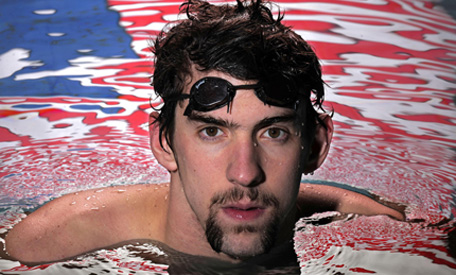Michael Phelps is one of the most decorated athletes in Olympic history, with 28 total medals, 23 of which are gold. At the 2008 Beijing Games, he won eight gold medals, breaking Mark Spitz’s 36-year old record.
Michael Phelps’ Early Days
Michael Fred Phelps III was born June 30, 1985, in Baltimore, Maryland. When he was 2, he developed a serious fever and his father Fred Phelps, a Maryland state trooper who divorced Phelps’ mother in 1994, rushed him to the hospital with the sirens blaring.
“If the infection hadn’t been treated within a few hours, I probably wouldn’t have pulled through,” says Phelps in his autobiography, “Michael Phelps: Beneath the Surface.” “The stopwatch was important in my life even then.”
Phelps began swimming at an early age, following in the footsteps of his two older sisters. Under the tutelage of coach Bob Bowman, Phelps became a nationally ranked swimmer and qualified for the 2000 Olympics the 200-meter butterfly, becoming the youngest American swimmer to qualify for the Olympics in 68 years.
Phelps finished fifth in his only Olympic event. The shy, hyperactive 15-year-old was awkward under the media spotlight and felt more comfortable in the water. “If I’m not in the water for a few days, I’m not the same person,” he said.
He set his sights on the 2004 Athens Olympics, dedicating hours a day to swimming and on-land workouts. “If I lose in Athens, it will be a choke,” he said.
Sources in this Story
- MP MichaelPhelps.com: Our Story
- The Baltimore Sun: One family’s ebb and flow
- Google Books: Michael Phelps: Beneath the Surface
- The Biography Channel: Michael Fred Phelps
- The Baltimore Sun: Life in the fast lane
- Time: Built for Speed
- The Baltimore Sun: For swimmer Phelps, Games pressure is off
- The Washington Post: Phelps Is Golden, Gracious
- ESPN: Handicapping Phelps’ run at Olympic glory
- Sports Illustrated: Sportsman of the Year: Michael Phelps
- The New York Times: Phelps Disciplined Over Marijuana Pipe Incident
- ESPN: Michael Phelps, U.S. win medley relay
- ESPN: Michael Phelps enjoying retirement, has no plans to return
Phelps’ Swimming Career
Phelps dominated the U.S. swimming trials at the 2004 Olympics, qualifying for a record six individual events. As he prepared for the Olympics, many thought he could match or break Mark Spitz’s record of seven gold medals in the 1972 games. Speedo offered him $1 million if he won seven golds.
In his third event, after winning a gold and a bronze in a relay event, he faced Australian swimmer Ian “Thorpedo” Thorpe in the much-anticipated 200-meter freestyle. Thorpe, who had said before the Olympics that Phelps couldn’t match Spitz’s feat, finished a half-second ahead of Phelps, who settled for third. “I guess you could say the pressure is off,” said Phelps after the race.
Phelps would rebound to win his next four races. He won his fifth gold medal—his seventh medal overall—in the 100-meter butterfly, beating teammate Ian Crocker by 0.04 of a second. Immediately after the race, he offered Crocker his spot on the 400-meter butterfly relay.
“It was a gesture of grace, and sportsmanship, with a touch of common sense,” wrote Michael E. Ruane of The Washington Post. Because he had run in the preliminaries, Phelps was awarded his eighth and final medal of the Games when the team won gold.
Phelps dominated the 2007 FINA World Championships, winning a record-tying seven gold medals and breaking five world records.
Phelps returned to the Olympics in 2008 with a second chance to break Spitz’s record, entering five individual events and three relays. In his second event, the 4×100-meter free relay, teammate Jason Lezak made a miraculous comeback on the final leg to preserve Phelps’ chance for perfection.
Phelps tied Spitz’s record in one of the closest finishes ever, beating Milorad Cavic of Serbia by one-hundredth of a second in the 100-meter butterfly. He finished with a gold in the 4×100-meter medley relay, giving him his record eighth gold medal.
The Man and His Work
- “Michael Phelps: The Untold Story of a Champion,” by Bob Schaller
- “Michael Phelps World’s Greatest Olympian,” by USA Today
- “Michael Phelps: Inside Story of the Beijing Games Olympics” (DVD)
The Rest of the Story
Phelps became a major celebrity after the Olympics, signing many endorsements and hosting Saturday Night Live. Sports Illustrated put him on the cover with his eight gold medals, recreating the famous poster of Spitz and his seven. The magazine later named Phelps its 2008 Sportsman of the Year.
Much of that marketability was lost, however, when photos of him smoking marijuana appeared in a tabloid. Phelps was suspended by USA Swimming and lost a sponsorship, though he was not charged with a crime.
He returned to swimming in May 2009 and swam for the United States in the 2012 Olympics in London for what was to be his final Olympics. FINA presented him with an award recognizing his work that said, “To Michael Phelps, the greatest Olympic athlete of all time.”
He went on to swim in the 2016 Olympics in Rio de Janeiro, where he earned five gold medals and one silver before retiring.
This article was originally written by Denis Cummings; it was updated May 24, 2017.











